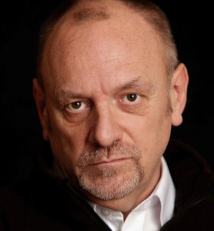Obituary. Peter Reynolds 1958 – 2016.
 It only seems right that I record the passing of my namesake and compatriot, a man who made a huge impact on the world of music, not only in Wales but much further afield.
It only seems right that I record the passing of my namesake and compatriot, a man who made a huge impact on the world of music, not only in Wales but much further afield.
Just four months younger than me, he was born in Cardiff in January 1958, 10 miles from where I was born in Newport, the previous September. We share the same three names: Peter John Reynolds. Clearly something of an eccentric but well respected, he is best known as the composer of the world’s shortest opera, ‘The Sands of Time’ (1993). It depicts a row that takes place during the boiling of an egg.
I can confirm that it is the only opera that I have listened to in full. Enjoy!
His obituary as published in The Times, 2nd November 2016
Peter Reynolds earned a place in Guinness World Records for The Sands of Time(1993), the world’s shortest opera. It lasts for three minutes, 34 seconds (no interval), about half the length of Darius Milhaud’s Deliverance of Theseus, which had held the record since 1928.
The piece is set in a suburban kitchen of the 1990s, as an egg is boiling (the length of the opera). Stan and Flo, husband and wife, are having an argument at breakfast when a knock at the door tells them that they have won the pools. Peace is restored as the egg is lifted out of the pan.
“It certainly has the influence of 19th-century Italian opera,” argued Reynolds, pointing out that his work included eight separate numbers. “Stan’s aria, ‘Down with the splash of cologne and deodorant spray’, was very much me doing early Verdi, the heroic tenor aria as in Il Trovatore. The patter song with its resonances of Gilbert and Sullivan is very quick.”
The Sands of Time, which has a libretto by Simon Rees, was conducted at its premiere at an outdoor shopping centre in Cardiff by Carlo Rizzi, the music director of Welsh National Opera. Reynolds later admitted that the work had been written in a hurry. “It took me an evening to write,” he said, adding: “I’m very proud to have used deodorant for the first time [in an opera]. It isn’t product placement. It’s simply facing reality in its harshest form.”
Later he would be embarrassed by the state of the work’s only copy. “I didn’t produce the neatest score in the world,” he said. “Twenty years on it’s still getting performances every year and each time I feel a bit more embarrassed about the old score.”
Peter John Reynolds was born in Cardiff in 1958. Almost as soon as he could walk he taught himself to play LPs and 78s on his parents’ 1954 radiogram. “I was enthusiastic, but none too careful and was often told off for playing 78s using an LP stylus,” he recalled.
He went to St Teilo’s school, studied music at University College, Cardiff, and was awarded a series of bursaries in the 1980s to attend composition classes at Dartington Summer School, with Morton Feldman, Peter Maxwell Davies and Gordon Crosse. In 1986 he was awarded the Michael Tippett award for composition, and the following year wrote his first large-scale commission, a work for chamber orchestra, that was performed at Dartington.
Over the following years Reynolds was an integral part of the vibrant Welsh music scene. He founded the PM Ensemble, major players in contemporary music at the end of the century; was artistic director of the Lower Machen Festival; wrote programme notes for more than 2,000 pieces of music; programmed concerts for St David’s Hall; set up a series of foyer concerts at Wales Millennium Centre; and, in 2009, published a history of the BBC National Orchestra of Wales.
In 1994 he joined the Royal Welsh College of Music and Drama, where he was friend, mentor and confidant to a wide range of students. He would caution them against wasting energy on large-scale composing, while encouraging vigorous discussion in the bar.
Reynolds’s music was characterised by stillness, simplicity, an occasional playfulness and a tendency to set unusual and quixotic texts. For example, Adieu to all Alluring Toys, a set of songs, took its title from the epitaph on an 18th-century child’s grave at a tiny country church in Breconshire. He was recently the recipient of a Creative Wales award, enabling him to explore the relationship between music, architecture and landscape.
He tended to compose in longhand rather than use computer software. “It slows me down and makes me consider more carefully what I write,” he said. “I remember that Morton Feldman used to say that copying out his music in different drafts brought him closer to the material.”
Friends recalled that he was often seen at his local farmers market, cooked a delicious tagine and enjoyed exploring cycle tracks around Cardiff on his bike. At the time of his death Reynolds, who never married, was working on a car-horn fanfare for the Vale of Glamorgan Festival, to be performed by vintage cars.
Peter Reynolds, composer, was born on January 12, 1958. He died suddenly on October 11, 2016, aged 58

R I p
Rusty
November 27, 2016 at 8:59 am